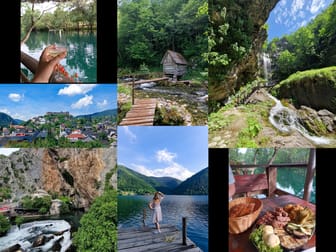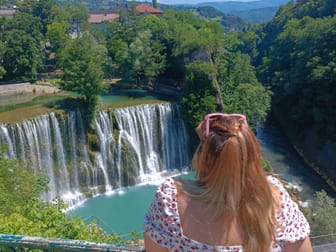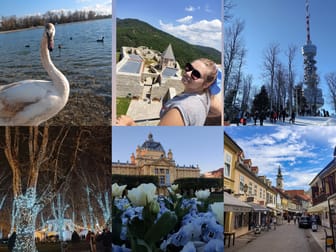48 Hours in Bosnia: Exploring the Una River and Bihać
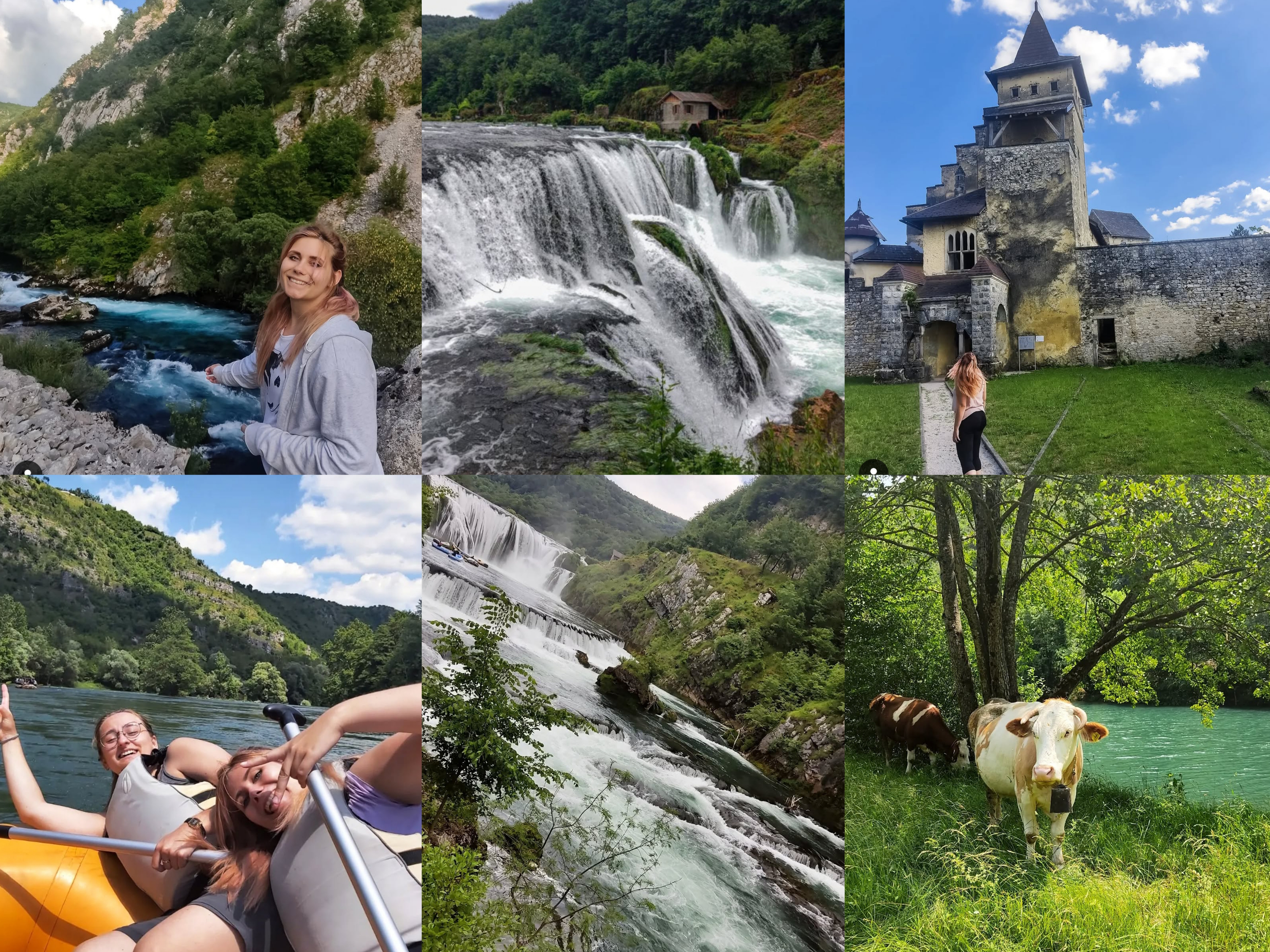
WHAT TO KNOW BEFORE BOSNIA AND HERZEGOVINA?
🚗 Car Sticker:
Make sure you have your country’s sticker (HR or your own).
📸 Speed Cameras & Police:
Lots of cameras on the roads and frequent police checks. Stick to speed limits!
⛽ Fuel: Cheaper in Bosnia!
Only 1.34 EUR per litre (July 2024)
💸 Currency
Exchange: Euros can be easily exchanged for Bosnian Marks (BAM) in anyBakery, shop, or café. Locals are super friendly! 😊
💳 Payment Methods:
You can pay with Revolut in Euros, or with cash in Euros and Marks.
📶 Internet:
Either get an eSIM on Revolut (check if your phone model supports eSIM) or buy a !hej Turist SIM card from HT Eronet at a gas station/kiosk.
> Daily: 10GB for 3KM
> Weekly: 20GB for 20KM
> Calls in BiH (7 days): 3KM
🔑Border
Passport is mandatory! Bosnia and Herzegovina is not part of the EU!
🌐 If you buy something, make sure to check beforehand whether you can take it back to the EU, as there are limits on food, drinks, cigarettes, and other items. ✅
DAY 1️⃣
Our first stop was Japodski otoci, great for morning coffee and a walk😊
📍Where are Japodski otoci?
Japodski otoci, or the Japodian Islands, are located near Bihać in Bosnia and Herzegovina. These small, picturesque islands are scattered along the Una River, surrounded by lush greenery and crystal-clear waters. The area is named after the ancient Japod people who once inhabited the region. Japodski otoci are a cultural and archaeological site near the village of Račić, offering a blend of natural beauty and historical significance.
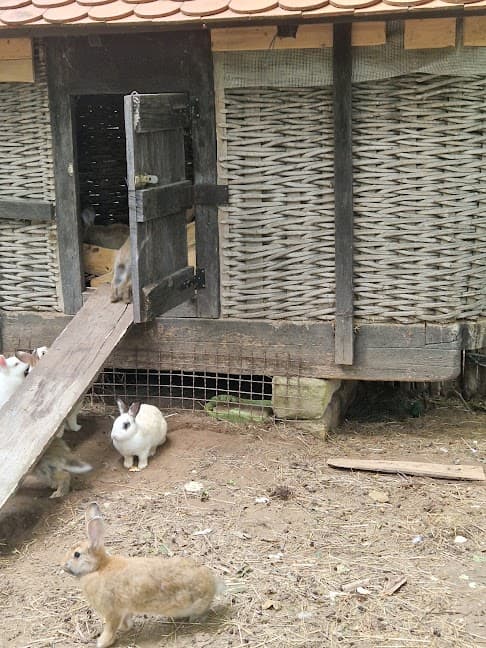
Unfortunately, the flyer is on Bosnian-Croatian so it is best for you to just visit it for yourself😊
After a short driving break, it’s time to head to Una National Park. The park has several entrances that are easily accessible by car, and the entrance fees are quite affordable. All the details are provided below.
📍Where is Una National Park?
Una National Park is located in the north-western part of Bosnia and Herzegovina, bordering Croatia. It stretches along the upper course of the stunning Una River, encompassing the municipalities of Bihać, Bosanski Petrovac, and Drvar. The park’s landscape is a breathtaking mix of lush forests, karst topography, cascading waterfalls, and crystal-clear rivers.
The region is easily accessible from the nearby town of Bihać, which serves as the main gateway. Visitors from Croatia can cross over through border points like Izačić and enjoy the natural splendour within minutes. The park’s location at the heart of the Dinaric Alps ensures that it remains a haven of unspoiled beauty, attracting adventurers and nature lovers alike.
Why is Una National Park special?
Una National Park is a natural treasure, celebrated for its exceptional geological and biological features. The park lies within the Dinaric Alps, a region renowned for its unique karst formations. Karst topography, characterised by limestone bedrock, has shaped the landscape into a wonderland of caves, sinkholes, and tufa barriers. The Una River, the park’s lifeline, is a textbook example of a tufa-forming river. Tufa, a type of porous limestone, is deposited as the river flows over cascades, creating mesmerising waterfalls such as Štrbački Buk and Martin Brod. These tufa barriers are not only geological marvels but also vital habitats for diverse ecosystems.
Biologically, Una National Park is a hotspot of biodiversity. Its pristine waters are home to endemic fish species, while the surrounding forests shelter rare birds, mammals, and plants. The park’s rivers and wetlands are crucial for amphibians and aquatic insects. Una National Park’s delicate interplay of geology and biology makes it a living laboratory, offering insights into karst dynamics and ecosystem resilience. It is a place where nature’s artistry is on full display, captivating visitors with its unspoiled splendour.
The main entrances to Una National Park are:
❗NOTE: every entrance has different price, prices here are from 2024 so be sure to check this before at their official site.
Here are the locations and entrances to Una National Park with ticket prices for adults and students:
💠Štrbački buk–Lohovo Zone (🚗 Entrances: Gorjevac, Ćukovi, Ćelije):
1. Gorjevac – Located on the M-5 highway, 14 km from Bihać.
2. Ćukovi – A pedestrian and bicycle-only entrance.
3. Ćelije – Accessible by car from Orašac to Štrbački buk.
🎟️ TICKETS:
Adults: 8 KM (€4.10), Students (group visits): 4 KM (€2.05)
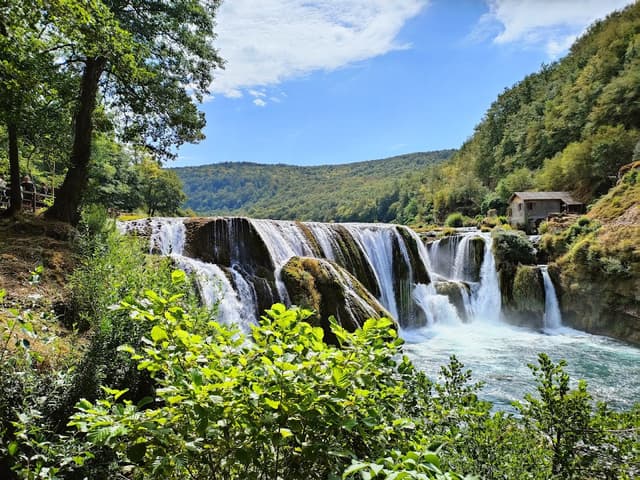
We went to the Gorjevac entrance, and from there, there was a relatively short walk to Štrbački buk. You can buy tickets ON-SITE, but it’s CASH ONLY❗💵❗
There are several viewpoints where you can admire the breathtaking Štrbački buk waterfall, the tallest and most spectacular in Una National Park, standing at 24.5 metres. Its origin is tied to tectonic shifts and the creation of tufa deposits. In the early 20th century, its banks were decorated with wooden water mills, resembling stilt houses of the prehistoric Japodes tribe, who lived in this region during the last millennium BCE.
The park has initiated efforts with UNESCO to list Štrbački buk, along with the waterfalls in Martin Brod, as a World Heritage Site.
💠 Martin Brod Zone (🌊 Entrance: Milančev buk):
4. Martin Brod – Leads to Milančev buk and offers a picnic area.
🎟️ TICKETS:
Adults: 2 KM (€1.02), Students (group visits): 1.50 KM (€0.77)
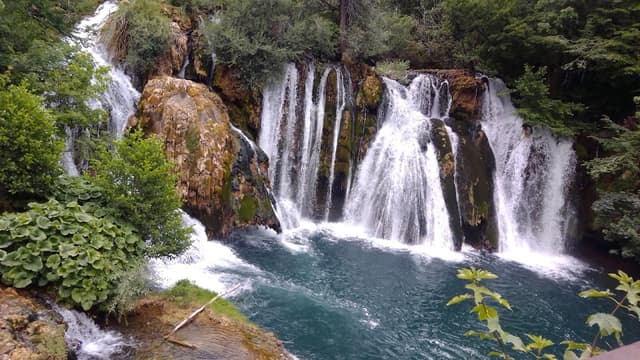
Located at the confluence of the Unac and Una rivers, Martin Brod is a gem of untouched natural beauty and cultural heritage. It is home to the largest waterfall complex in Una National Park, featuring countless cascades, islands, and rapids. Among its highlights is Milančev buk, an 800-metre-long waterfall complex with a total height difference of 54 metres, formed by tectonic shifts and unique tufa barriers. This natural marvel, with its diverse shapes and sizes, captivates visitors, inspires artists, and intrigues scientists alike.
The settlement originated from a medieval town built in the 14th or 15th century, possibly even earlier. Today, it also houses the Rmanj Monastery, an important spiritual site. Once filled with wooden mills, Martin Brod offers a glimpse into its rich history and stunning environment, making it a must-visit destination for nature enthusiasts and history lovers alike.
Legend of Martin Brod:
Martin Brod’s name originates from the tragic story of Marta, a young girl who drowned while crossing the Una River to meet her forbidden love. The crossing, or "brod," was named in her memory, symbolising a timeless tale of heartbreak and love, forever tied to this enchanting place.
💠Lohovo Entrance:
5. Lohovo – Near Bihać, known for its scenic walking paths.
🎟️ TICKETS:
Adults: 3 KM (€1.54), Students: 2.50 KM (€1.28)
6. Raćić – Currently under development.
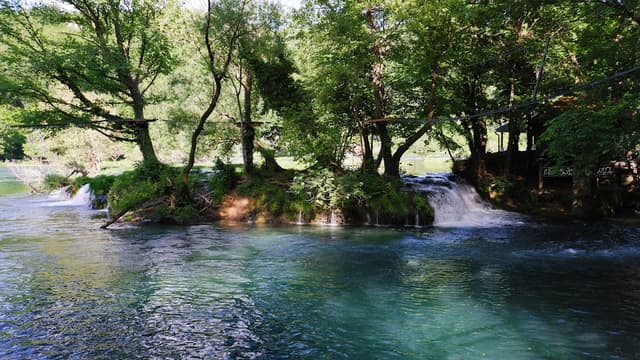
🌟 Special Activities:
Rafting/Kayaking/Canoeing:
Štrbački buk–Lohovo: 12 KM (€6.15)
Martin Brod–Kulen Vakuf: 6 KM (€3.08)
Troslap–Dvoslap: 3 KM (€1.54)
Diving:
Martin Brod–Lohovo: 12 KM (€6.15)
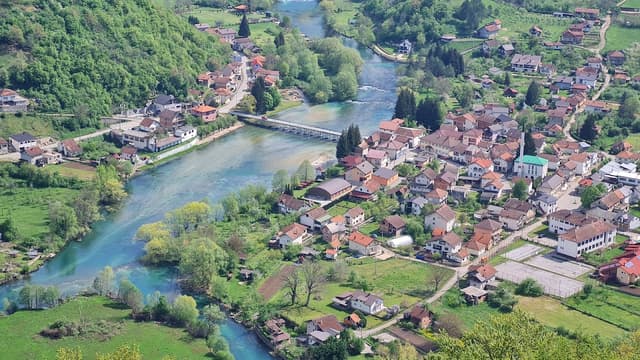
For the latest prices and updates, especially given recent flooding in parts of Bosnia 🌧️, visit the official Una National Park website 🌐.
💠Unca Canyon
Unfortunately, we didn’t visit the last entrance or Kulen Vakuf because we wanted to explore the Unac Canyon. This is a short 2 km hike from Martin Brod. You can leave your car in Martin Brod and follow the trail towards the mountains. The path is easy, well-marked, and impossible to miss. Here are a few pictures from our hike. Since I didn’t have Wikiloc back then, I’m sharing someone else’s accurate trail for reference to help you plan your own adventure!
The Unac Canyon is a remarkable geomorphological phenomenon within the Una National Park. The Unac River originates at 876 metres near Mount Šator and flows 66 kilometres through gorges, valleys, and karst formations, dropping 450 metres in elevation. Its narrowest canyon, reaching depths of up to 350 metres, lies near Martin Brod.
The river enriches the Una with its pristine, cold waters. Unique karst features include travertine barriers, cascades, and seasonal lakes, crucial for biodiversity. Quaternary sediments, paleoendemics, and relict species thrive in the canyon, making it vital for ecological and geological studies.
Conservation is essential, particularly due to erosion risks on steep slopes. The canyon supports eco-tourism, educational visits, rafting, and extreme sports, offering a blend of natural beauty and recreational opportunities.
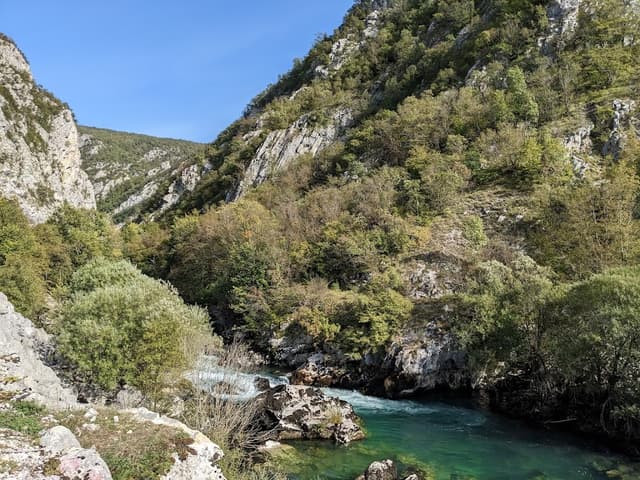
DAY 2️⃣
In Bihać, you’ll find many affordable accommodation options—we booked through Booking.com. On day two, we started the morning like true Balkan locals, heading straight to a café in the city centre for coffee. It’s a cherished tradition! Afterward, we explored Bihać’s few sights. The city is very very very very small, so you’ll have plenty of time to relax. A highlight is the beautiful meadow by the Una River, perfect for unwinding. Sightseeing took about 30 minutes, leaving the rest of the day for pure relaxation.
Where is Bihać?
Bihać is a charming town in the NW corner of Bosnia and Herzegovina, situated along the banks of the emerald-green Una River. Nestled in the heart of the Una-Sana Canton, the town lies near the Croatian border, making it a convenient stop for travellers exploring the region. Bihać is surrounded by picturesque landscapes, including mountains, rivers, and forests, making it an ideal destination for outdoor enthusiasts. The town is also the cultural and administrative centre of the canton, blending historical significance with natural beauty.
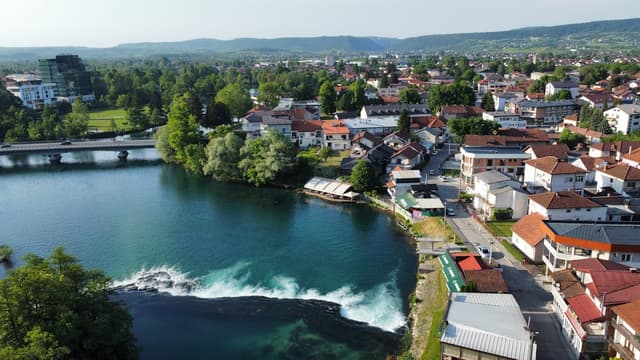
Short history and importance of Bihać
Bihać has a rich and complex history, reflecting its strategic location at the crossroads of civilisations. First mentioned in historical records in 1260, Bihać developed as a medieval town and a key trade centre in the Una River valley. During the Middle Ages, it was part of the Hungarian Kingdom before falling under Ottoman rule in the 16th century. The Ottomans fortified the town, turning it into a military stronghold. This blend of influences left a cultural legacy visible in its architecture and traditions.
In the 19th and 20th centuries, Bihać became part of the Austro-Hungarian Empire and later Yugoslavia, further shaping its identity. During World War II, the town played a significant role as the site of the Bihać Republic, a short-lived liberated territory established by Yugoslav partisans. Today, Bihać’s historical significance lies in its role as a cultural melting pot and its proximity to Una National Park, which draws visitors to the area. Its historical landmarks and natural surroundings make it a must-visit destination in Bosnia and Herzegovina.
What to see in Bihać:
🏞️ Una National Park: The park’s proximity makes it a must-visit for its waterfalls, tufa barriers, and diverse ecosystems.
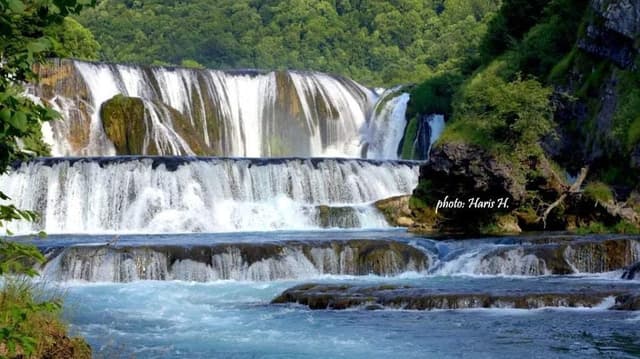
🕌Fethija Mosque: A unique Gothic structure converted into a mosque, reflecting Bihać’s diverse cultural heritage.
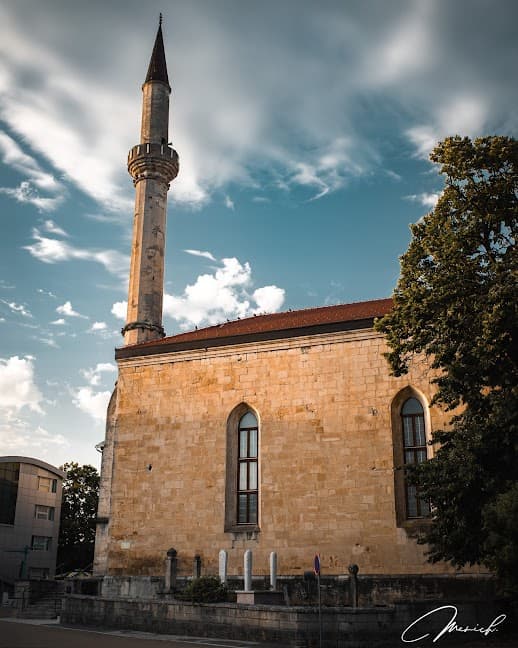
🏰 Kapetanova kula (Captain’s Tower): A medieval fortification housing a museum with artefacts from the town’s history.
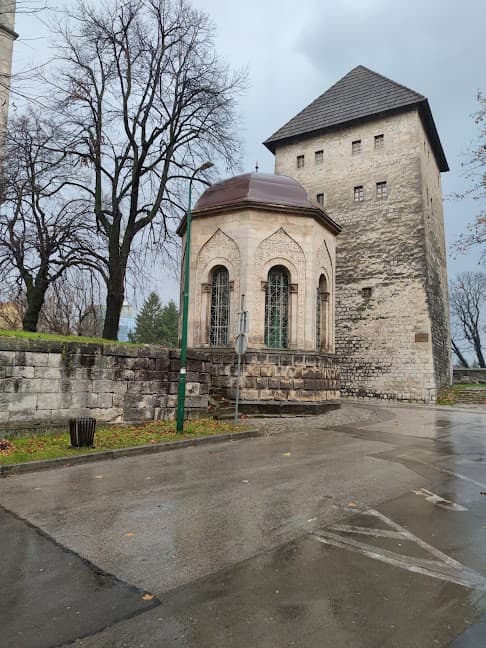
🪦Garavice Memorial Park: A solemn site commemorating victims of World War II, highlighting Bihać’s historical significance.

After our morning coffee and sightseeing, we decided to book a rafting trip on the Una River. Rafting is the main attraction here, and there are plenty of agencies to choose from—if you’re unsure, ask the locals. We booked with the agency linked below. It cost us €20 for a 4-hour adventure (as of June 2022). You can pay in euros or Bosnian marks, which is super convenient.
A little tip: you’ll get a small snack during the rafting trip, but it’s not enough to keep you full, so bring some extra food with you. Also, if you have a waterproof phone container, definitely take it along to capture some amazing moments. We didn’t have one, so we only managed a couple of photos, but trust me, it was an incredible experience. Being prepared will make it even more enjoyable! 🌊📸
Afterwards, our next stop was...
💠Ostrožac Castle
Ostrožac Castle, near Cazin in Bosnia and Herzegovina, is a medieval fortress dating back to the 13th century, originally owned by the Babonić family. It was later expanded under Ottoman rule and reconstructed in the early 20th century by Lothar von Berks as a gift for his Habsburg wife, Isabella. The castle is renowned for its open-air Sculpture Park, featuring over 150 bihacite stone sculptures from the Colony of Sculptors Ostrožac. Designated a National Monument, it hosts cultural events and is undergoing gradual restoration.
🎟️ TICKETS:
Adults: 4 KM (~€2); Children: 2 KM (~€1)
This was in 2022, maybe prices changed.
This marks the end of our adventure as we had to head back to Zagreb. If you enjoyed this journey, check out my ultimate guide through Bosnia linked below—it’s packed with tips and insights! 😊 If you found this helpful and want to support my travels, feel free to leave a tip. Your support means the world to me! 💛✨
The home for unique & authentic travel




